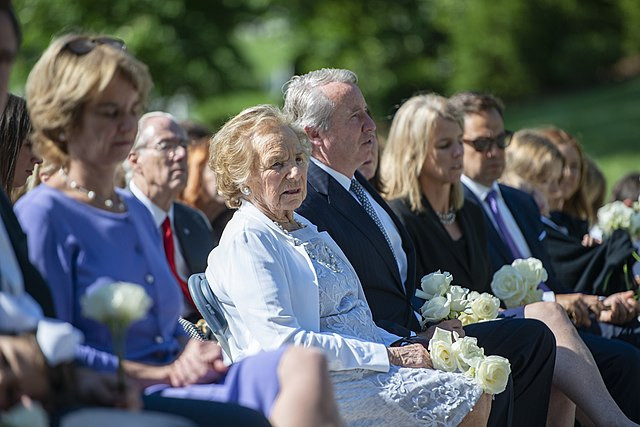Ethel Kennedy, the widow of former U.S. Attorney General Robert F. Kennedy and a fervent advocate for human rights, passed away on Thursday at the age of 96. Her death marks the end of a significant chapter in American history, one intertwined with tragedy, resilience, and a legacy of activism.
Joe Kennedy III, her grandson and former Massachusetts Congressman, confirmed the news of her passing in a heartfelt post on social media platform X, formerly known as Twitter. "It is with our hearts full of love that we announce the passing of our amazing grandmother, Ethel Kennedy," he wrote. "Along with a lifetime's work in social justice and human rights, our mother leaves behind nine children, 34 grandchildren, and 24 great-grandchildren, all of whom love her dearly."
Ethel Kennedy's life was indelibly linked to one of America's most prominent political families. Born in 1928 in Chicago and raised in Greenwich, Connecticut, she married Robert F. Kennedy in 1950, becoming an integral part of the Kennedy legacy. Her husband, known for his advocacy on civil rights and justice, was assassinated in 1968 during his run for the U.S. presidency, just after winning the California Democratic primary. The tragic event, which unfolded in front of a shocked nation, saw Ethel by his side, three months pregnant with their youngest daughter, Rory.
Throughout her life, Ethel Kennedy channeled her grief into activism. She founded the Robert F. Kennedy Human Rights organization in 1968 to carry on her husband's mission for social justice. Over the years, she became a passionate voice for human rights, taking her activism to various corners of the globe. She marched alongside Cesar Chavez to support the Farm Workers movement, confronted Kenyan dictator Daniel Arap Moi on human rights abuses, and even participated in a hunger strike in 2018 to protest the Trump administration's immigration policies.
In 2014, President Barack Obama awarded her the Presidential Medal of Freedom, the nation's highest civilian honor, recognizing her tireless work for justice and equality. Obama described her as a "matriarch of optimism and moral courage," a sentiment echoed by President Joe Biden, who called her an "American icon" and a "dear friend" in a statement following her death.
Despite her public achievements, Ethel Kennedy's personal life was marked by a series of profound tragedies. The Kennedy family endured numerous losses, including the deaths of her son David in 1984 from a drug overdose and another son, Michael, in a skiing accident in 1997. More recently, her granddaughter Saoirse Kennedy Hill died of an accidental overdose in 2019, and another granddaughter, Maeve Kennedy Townsend McKean, drowned along with her son in a canoe accident in 2020.
Ethel's resilience in the face of such adversity became a hallmark of her character. Her devotion to her family, faith, and the causes she championed earned her widespread admiration. "She was a devout Catholic and a daily communicant," Joe Kennedy III noted in his tribute, emphasizing that she took solace in her faith and the belief that she was now reunited with her beloved husband, Robert, and their children and grandchildren who had passed before her.
The Kennedy family, long regarded as the heart of the Democratic Party, recently faced internal strife when Ethel's son, Robert F. Kennedy Jr., launched a controversial bid for the U.S. presidency in 2024. Initially running as a Democrat before switching to an independent campaign, RFK Jr. was met with public disapproval from many in his family, who called his actions "dangerous" and expressed their dismay over his endorsement of former President Donald Trump. This division within the family highlighted the tensions that sometimes accompany the Kennedy legacy.
Ethel Kennedy's life was a testament to courage and perseverance, qualities that were reflected in her public and private endeavors. Her ability to transform personal grief into a force for good in the world served as an inspiration to many. "Generations of Americans did not toil and sacrifice to build a country where children and their parents are placed in cages to advance a cynical political agenda," she said in 2018, speaking out against policies she saw as inhumane.
Her marriage to Robert F. Kennedy brought her into a family that was no stranger to public service or tragedy. Her brother-in-law, President John F. Kennedy, was assassinated in 1963, and she stood by as her husband became a leading figure in the struggle for civil rights, only to be felled by an assassin's bullet five years later. Even after these devastating events, Ethel never wavered in her commitment to their shared ideals.






